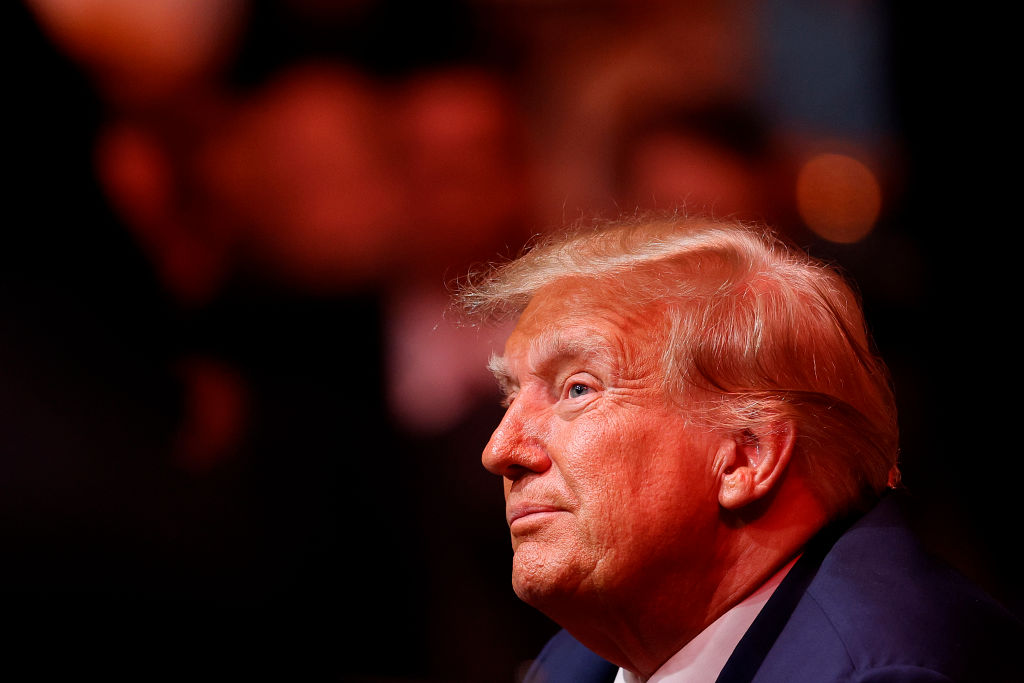On Wednesday Benjy Sarlin had a bit of fun scaring his readers at Semafor. “Don’t assume this is Donald Trump’s last run,” he warned them.
I, a pessimist by nature, read the piece with puzzlement. “How can he run in 2028?” I wondered. “He’ll be term-limited by then.”
But I understood Sarlin’s anxiety. In 2023 the Trump saga feels like a horror-movie franchise. After endless mayhem, someone finally slays the monster—and then there he is again somehow, alive and well in a sequel.
Nightmare on Trump Street is only in its third chapter. Given how elderly both of Trump’s parents were before they passed, we should probably start gaming out a release date for chapter four sometime in 2032.
I’m going to defy my own nature and say something optimistic, however: There won’t be another Trump sequel after 2024. This is it.
He’s less Freddy Krueger or Jason Voorhees than he is Michael Corleone, after all. And Michael only lasted for three films.
I’m 90 percent confident in my prediction. Well … maybe 70 percent confident.
Fine, 51 percent confident.
But definitely more confident than not.
I should clarify what I mean when I say there won’t be another Trump sequel. One way or another, he won’t be the Republican nominee for president in 2028.
Which is not to say that he won’t be a candidate for president. More on that later.
“He’ll be too old in 2028,” you say, and objectively you’re correct. An 82-year-old has no business working a job as demanding as the presidency.
But we’re about to test in the starkest possible way whether the American public shares that belief. If Joe Biden were to win reelection in 2024, an outcome that’s more likely than not at the moment, by what logic should Trump be deemed too old in 2028?
“He’ll be in prison,” you might counter. Admittedly, that outcome gets more likely every day.
But let’s not be naive. Even if he’s convicted, he’ll never do time. The messy logistics of incarcerating a man with his own Secret Service detail would encourage the relevant executive authority to commute his sentence so that he serves it somewhere more comfortable.
Besides, as Sarlin reminds us, prisoners can run for president. If you think right-wing populists wouldn’t vote for someone who’s behind bars, or feel more inclined to vote for him because he’s behind bars, you don’t understand how amoral their approach to criminal justice has become.
“He’ll be too discouraged by a second loss to try again,” you insist. A normal human being would be, I agree.
See the problem?
We tend to treat Trump’s “rigged election” nonsense as a strategy to save face by a man who knows that he lost in 2020 and is desperate to keep the truth from his fan club, but even that gives him too much credit for normalcy. I don’t believe he arrives at his understanding of reality based on a considered judgment of which information is true and which is false. I suspect he decides what’s real and what isn’t based on whether a given piece of information he receives is good for him or bad.
That is, although “Stop the Steal” might have begun as a cynical PR ploy, at some point I think he convinced himself it was true. If he loses again in 2024 he’ll convince himself that that election was rigged too, possibly more brazenly than the previous one was. Why should he be discouraged from running again in 2028 by his alleged unpopularity at the polls if that unpopularity is a mirage concocted by corrupt opponents?
There are other reasons why he might not be discouraged.
Trump’s defining trait is his narcissism. In his youth he spent his days feeding gossip about himself to New York tabloids; in middle age he became a television star on a show built upon the myth of his alleged genius at business; in old age he became president and a political leader who enjoys fanatic devotion from many of his party’s supporters. He’ll never retreat from the public spotlight. It’s unthinkable.
If you’re imagining him doing something in 2028 other than running for president, you need a theory of how he might command a giant audience at this stage of his life outside of politics. Where does he go to scratch his itch for adulation? What media property would dare touch him now by offering him a new show, laying aside the question of whether a man of his age could carry one?
How many cult leaders retire?
Trump wants to be president again, I’m sure, but he needs to preserve his dominance over the American right. Last month Fox News sifted through his posts on Truth Social and discovered that he had attacked Ron DeSantis four times as often recently as he had Joe Biden; one could attribute that to the dynamics of primary politics but I suspect it’s at least as much a function of Trump’s status anxiety. Not being president is a misfortune, but not being the undisputed monarch of a party he remade in his own image would be an intolerable humiliation.
He’s always seemed to enjoy punishing his skeptics on the right more than battling his enemies on the left. Partly that’s a numbers thing: In a 50/50 country he and his endorsees are stuck eking out unimpressive wins against Democrats, but in a red-state primary they can scratch their itch for dominance by crushing anti-Trumpers like Liz Cheney. It’s also partly a function of Trump’s weird mob-boss craving for “loyalty.” (Again, more Corleone than Freddy Krueger.) Joe Biden may be a lowly lib but Cheney and Ron DeSantis are something much worse, traitors.
He built a cult. He’s not going to hand it over to some other Republican in 2028 or meekly stand aside while less charismatic nationalist pretenders wrestle for control of it. He can be quite dogged about holding onto something when he concludes, rightly or not, that it “belongs” to him. If you want the cult, you’ll need to take it from him.
And who knows? The 2028 cycle could be ripe for Republican victory. America might be coming off eight years of Democratic rule, possibly with the lackluster Kamala Harris as president; an unelectable left-winger in the AOC mold might surge to the nomination; a Republican defeat in 2024 after nominating someone else might convince the right that it can’t win without Trump and his devotees fully onboard with the GOP. He might look at all of that and decide that he stands a real chance of winning. A Trump 2028 candidacy could happen.
But a Trump 2028 Republican nomination?
No way. Fifty-one percent confidence.
“There’s no education in the second kick of a mule,” it’s said. But what if the victim of the kick is especially thick-headed?
A dullard might not draw any lessons from the first or second kick, or even the third. But eventually, dazed and bleeding, said dullard might conclude that they shouldn’t stand so close to the mule.
Republicans won the presidency with Trump in 2016 but lost the popular vote. Under his leadership they lost the House in 2018, the presidency and the Senate in 2020, and grossly underperformed expectations in 2022. If they nominate him again in 2024, it’s more likely than not that they’ll lose again, potentially by an embarrassing margin to an enfeebled octogenarian.
Eventually the populist base of the Republican Party will grudgingly consider the possibility that their enemies are right and that Trump and his acolytes are more of a liability than an asset.
In fairness, many already have considered it. Even now, with Trump enjoying a bounce in primary polling following his indictment in Manhattan, only slightly more than half of Republicans support him. Once Ron DeSantis formally enters the race and begins running ads, that number is apt to slip to less than half. If Trump wins the nomination again, the huge number of righties who favored a different nominee will be primed to blame him squarely if he loses to Biden. Some who did support him in the primary will conclude afterward that they were wrong to do so.
My opinion of Republican voters is as low as anyone’s, but I suspect the fourth kick of the mule will be enough education for most.
There’s also the matter of his age. In theory, Democrats nominating 82-year-old Joe Biden in 2024 justifies Republicans nominating 82-year-old Donald Trump in 2028, but in practice everything depends on how Biden performs during his second term. If, in five years, the president seems no less cogent or vital than he does now, Republican primary voters might reasonably conclude that it’s worth rolling the dice on another 80+ candidate.
Show of hands: Who thinks Joe Biden will look just as cogent and vital in five years as he does now? Who thinks Trump will?
Even if Republican voters are inclined to ignore his age and nominate him anyway in 2028—and they’re fully capable, having had lots of practice at avoiding signs of his deterioration—the potential match-up that’s waiting might shake some sense into them. As old as Biden is, there’s only a small gap between his age and Trump’s. That wouldn’t be the case in the 2028 election. An 82-year-old Trump would likely be facing 61-year-old Gavin Newsom, 57-year-old Gretchen Whitmer, 55-year-old Josh Shapiro, 50-year-old Wes Moore, or some other Democratic whippersnapper.
Having just wrapped up two terms of Biden, I can’t imagine swing voters would be keen for another octogenarian presidency. Republicans would be fools to nominate Trump in that context. Luckily for him, many are fools. Unluckily for him, probably not enough.
Besides, there are bound to be young, exciting, energetic authoritarian alternatives emerging in right-wing politics to scratch the itch of Trumpers in 2028. If you want a Republican nominee who believes the president shouldn’t enforce court rulings he doesn’t like and aims to “go in directions that a lot of conservatives right now are uncomfortable with,” why not choose J.D. Vance? If you want an avowed Christian nationalist prone to chirping about an American “divorce” between red states and blue ones, may I interest you in Marjorie Taylor Greene?
For cripes sake, the traditionally conservative governor of Texas is looking to pardon a convicted murderer because he happened to kill a politically disfavored victim. As crazy as this party already is, it might be so far gone by 2028 that Trump himself will end up as the relatively “good Republican” in the familiar media narrative of how much better the right used to be.
And contrary to what I said earlier, I think there is a chance that a resounding defeat in 2024 might make Trump think better of running again in 2028.
He’ll tell his fans that the 2024 election was rigged against him, of course. On some level he’ll even believe it. But there are diminishing returns to the “I wuz robbed” excuse, especially if his margin of defeat ends up being worse next time than it was in 2020. At some point he’ll wonder what another stinging electoral rebuke might do to his chances in the 2028 Republican primary. As I said, he can tolerate not being president, but losing a popularity contest to some other right-winger in an election conducted entirely among “his people” would be unbearable.
I think he’d chicken out, preferring to quit as undefeated Republican champion rather than give the right an opportunity to say the words that made him (even more) famous: You’re fired.
If he can’t win the GOP nomination in 2028 but won’t relinquish the spotlight that comes with being a major political figure, what will he do?
The answer is obvious, no?
Per ABC reporter Jonathan Karl, on his last day as president in 2021 Trump put RNC chief Ronna McDaniel on notice.
“I’m done,” Trump said to McDaniel, according to the book. “I’m starting my own party.”
“You cannot do that,” McDaniel replied to Trump. “If you do, we will lose forever.”
“Exactly. You lose forever without me,” Trump shot back. “I don’t care.”
Trump told McDaniel that starting his own party was “what Republicans deserve for not sticking up for me,” Karl wrote.
Eventually, for reasons that are unclear, he thought better of forming the so-called “Patriot Party.” Maybe he realized that the GOP would no longer be willing to pay his bills if he left it. Or maybe he assumed that most Republican voters would abandon him after January 6, leaving him with no choice but to lead his most devoted disciples off into the wilderness in order to remain a political leader.
I tend not to believe that, but I like the idea of even Trump overestimating the basic decency of the modern right.
If he loses again in 2024, my guess is that he’ll conclude he has nothing to gain by remaining a Republican and that his path to continued relevance runs through blowing the party up in 2028. He’ll be looking for revenge on the many Republican voters who failed him on Election Day—Never Trumpers, of course, but also conservatives who voted for him twice before and then came to believe he’s too far gone to be trusted again with power. Some Ron DeSantis devotees will also have withheld their votes from him, bearing him a grudge for his vicious effort to humiliate their candidate in the primary.
Trump will look at the exit polling, stew about the many Republicans inside and outside Washington who didn’t vote for him, and conclude as he did in 2021 that not enough members of his own party “stuck up for him.” To repeat: He’s always seemed to savor punishing his skeptics on the right with special relish. Once he realizes he’ll never be president again and that even many of his fans won’t buy another “rigged election” fairy tale to explain his defeat, he’ll follow his vindictive instincts by scapegoating the “traitors” on his own side for his failure. The obvious way to retaliate against them will be to form a third party with no prospect of winning in 2028 but a good prospect of tanking the Republican Party’s chances of doing so.
“You lose forever without me.” That’ll be his final bequest to a movement that followed him off an electoral cliff and went on apologizing for him all the way down. They deserve it.







Please note that we at The Dispatch hold ourselves, our work, and our commenters to a higher standard than other places on the internet. We welcome comments that foster genuine debate or discussion—including comments critical of us or our work—but responses that include ad hominem attacks on fellow Dispatch members or are intended to stoke fear and anger may be moderated.
With your membership, you only have the ability to comment on The Morning Dispatch articles. Consider upgrading to join the conversation everywhere.